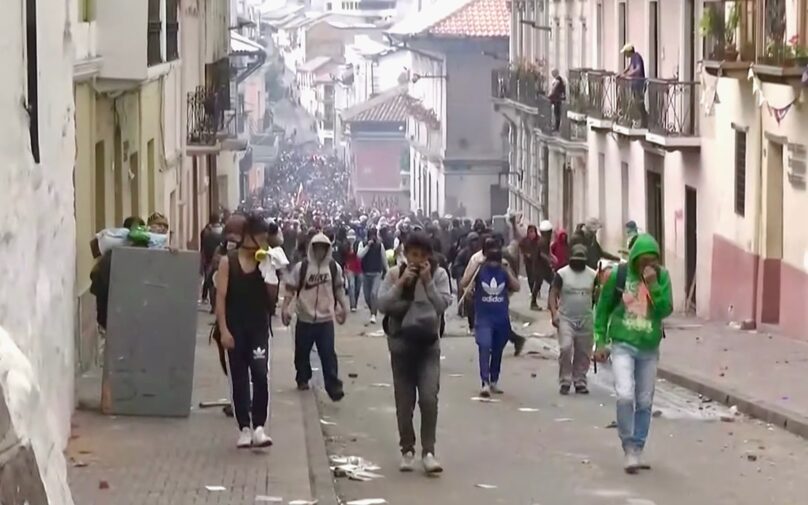

Ecuador has been plunged into turmoil by mass protests of indigenous people, trade unions, and students against a neoliberal IMF austerity progamme which has triggered cuts to fuel subsidies and hikes in the cost of basic consumer goods.
On Monday President Lenín Moreno moved his government 150 miles from Quito to Guayaquil, to escape the imminent arrival of thousands of indigenous people advancing along the main roads of the Andes towards the capital. Moreno accuses former President Rafael Correa and his allies of stirring up the masses for their own political ends.
More than 500 people have been arrested since the demonstrations began. Traffic on the bridges leading to Guayaquil was temporarily interrupted by government order and the Ministry of Education once again announced the suspension of classes.
On Tuesday, demonstrators arriving in the capital after road blockades and violent clashes between the police, military, and marchers, stormed the National Assembly and marched on the presidential palace.
The indigenous leaders announced that more than 20,000 demonstrators would arrive in Quito in the next few days to force President Moreno to revoke the austerity measures.
“At this moment, our peoples and nationalities are mobilizing, advancing towards the city of Quito to demand and reject these measures that hit the pockets of all Ecuadorians,” said the president of the Confederation of Indigenous Peoples , Jaime Vargas, while thousands of people packed the roads in the north of the country.
At the same event, the president of the United Front of Workers, Nelson Erazo, criticised Sunday’s statements by the Minister of Defense, Oswaldo Jarrín, in which he warned the demonstrators not to challenge or provoke the armed forces. According to Erazo, these declarations sounded like a declaration of war on the people and he also said that the mobilisation will not stop until the government backs down. A national strike was called for Wednesday 9 October.
According to government figures, the withdrawal of the state subsidy to gasoline will save the state $1.4 billion. Transport workers initiated the protests with a national strike that led to major clashes between citizens and security forces, resulting in the government declaring a state of emergency. Freedom of assembly was restricted, and the military deployed in the main cities and on the roads.
After the suspension of the general transport strike, the social organisations and the Confederation of Indigenous Peoples took up the call and amped up the pressure. The government deployed riot vehicles, mounted police and tear gas to respond to the massive concentrations of protesters armed with sticks and stones.
Moreno’s betrayals
Lenín Moreno, the vice president of former president Rafael Correa, won the 2017 Ecuadorian elections by proposing to continue Correa’s policies. Unlike the other Latin American countries where US imperialism has been tightening its economic siege and imposing its will via parliamentary and judicial coups, as in Brazil, Paraguay, Nicaragua and in particular Venezuela, where it precipitated an immense political and economic crisis, in Ecuador, it seemed the stage was set for a continuation of Rafael Correa’s populist programme.
But after taking office, Moreno showed his true face. His treachery became evident from the beginning of his mandate, with political persecution of members of the same alliance that with honest intentions made him president. The measures taken by this new government prove that aims to reverse the policy of its predecessor. With the excuse of “fighting against corruption” Moreno started a campaign of witch hunts against his former allies. Rafael Correa himself was the subject of accusations by the State Comptroller General that claimed irregularities in the management of public debt and negotiation of oil contracts with Chinese companies during his administration.
The betrayal continues with new alliances with the big Ecuadorian bankers, agreements with the IMF, the ending of political asylum in the London Ecuadorean embassy for WikiLeaks founder Julian Assange and constant media campaigns demonising the social movements and left-wing militants.
A government against the people
In less than three years, the Moreno government has increased Ecuador’s debt by more than $20 billion while slashing taxes on business that add up to $4,295 million. Meanwhile, the bankers have raked in profits of more than $500 billion.
With the implementation of the IMF package, the government has saddled the Ecuadorian working class, rural poor, and indigenous peoples with the costs of their own crisis.
From then on began the demonstrations of a population sick of the Moreno government’s attacks. The transport workers who initiated the movement were soon joined by other forces from the social movements, bringing together students, indigenous people and peasants who, despite their differences, united to fight against the traitor Moreno’s government and its neoliberal adjustment policies.
This government acting against the interests of the people and sustained by the repression and forces of imperialism must be overthrown by the unified Ecuadorian workers, peasants and indigenous people. To sustain the movement and go on to victory the Indigenous Confederation and the Workers‘ Federation must establish coordinating committees to link up the different campaigns and turn marches and protests into a revolutionary general strike, paralysing the state apparatus, forces of repression, and profits of the rich.
The goal of the movement must be to replace the bosses‘ government with a government of workers, poor peasants and indigenous peoples, which could organise elections to a sovereign constituent assembly where the working people can enact anticapiatalist and anti-imperialist solutions to the country‘s problems. This would be a huge step towards throwing back the reactionary tide sweeping the content.
The Liga Socialista is the Brazilian section of the League for the Fifth International.